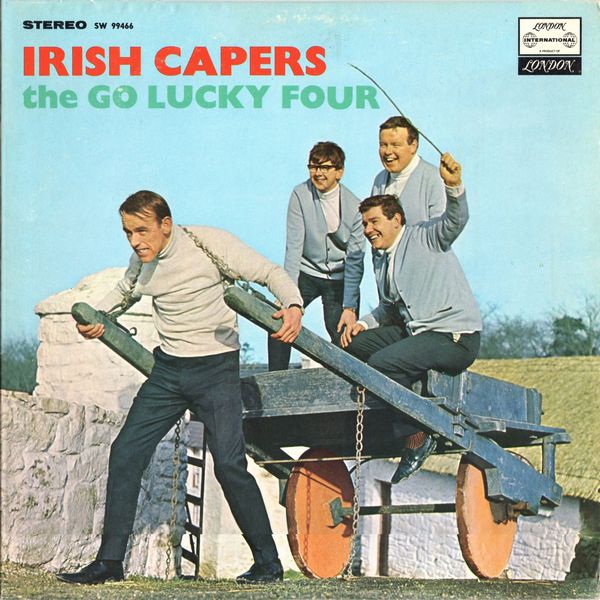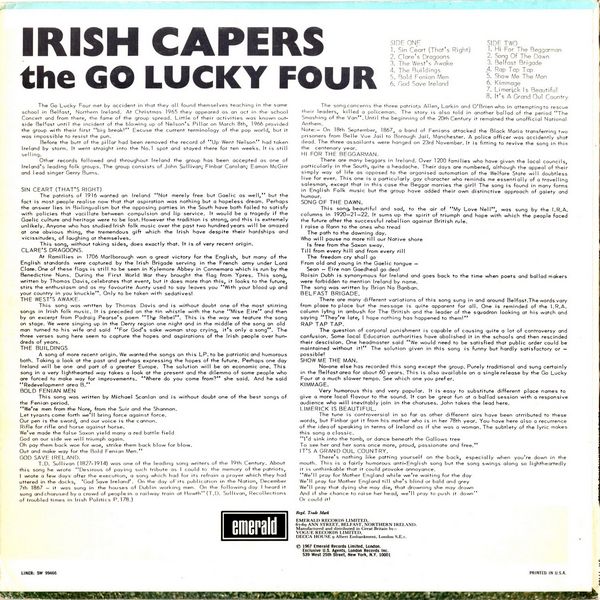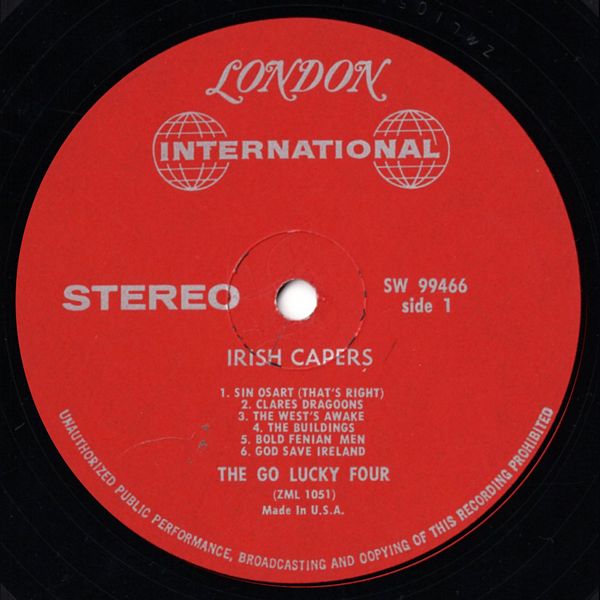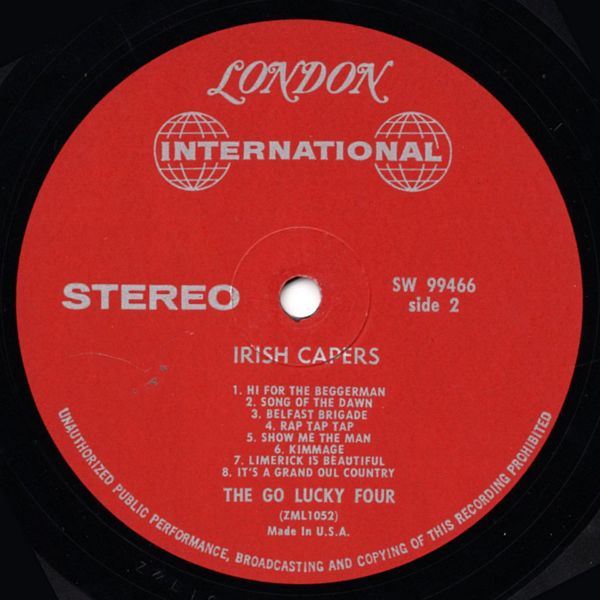

|



|
Sleeve Notes
The Go Lucky Four met by accident in that they all found themselves teaching in the same school in Belfast, Northern Ireland. At Christmas 1965 they appeared as an act in the school Concert and from there, the fame of the group spread. Little of their activities was known outside Belfast until the incident of the blowing up of Nelson's Pillar on March 8th, 1966 provided the group with their first "big break!" Excuse the current terminology of the pop world, but it was impossible to resist the pun.
Before the butt of the pillar had been removed the record of "Up Went Nelson" had taken Ireland by storm. It went straight into the No.1 spot and stayed there for ten weeks. It is still selling.
Other records followed and throughout Ireland the group has been accepted as one of Ireland's leading folk groups. The group consists of John Sullivan; Finbar Carolan; Eamon McGirr and Lead singer Gerry Burns.
SIN CEART ( THAT'S RIGHT)
The patriots of 1916 wanted an Ireland "Not merely free but Gaelic as well," but the fact is most people realise now that that aspiration was nothing but a hopeless dream. Perhaps the answer lies in Bi-lingualism but the opposing parties in the South have both failed to satisfy with policies that vacillate between compulsion and lip service. It would be a tragedy if the Gaelic culture and heritage were to be lost. However the tradition is strong, and this is extremely unlikely. Anyone who has studied Irish folk music over the past two hundred years will be amazed at one obvious thing, the tremendous gift which the Irish have despite their hardships and vicissitudes, of laughing at themselves.
This song, without taking sides, does exactly that. It is of very recent origin.
CLARE'S DRAGOONS
At Ramillies in 1706 Marlborough won a great victory for the English, but many of the English standards were captured by the Irish Brigade serving in the French army under Lord Clare. One of these flags is still to be seen in Kylemore Abbey in Connemara which is run by the Benedictine Nuns. During the First World War they brought the flag from Ypres. This song, written by Thomas Davis, celebrates that event, but it does more than this, it looks to the future, stirs the enthusiasm and as my favourite Aunty used to say leaves you "With your blood up and your country in you knuckle". Only to be taken with sedatives!
THE WEST'S AWAKE
This song was written by Thomas Davis and is without doubt one of the most stirring songs in Irish folk music. It is preceded on the tin whistle with the tune "Mise Eire" and then by an excerpt from Padraig Pearse's poem "The Rebel". This is the way we feature the song on stage. We were singing up in the Derry region one night and in the middle of the song an old man turned to his wife and said "For God's sake woman stop crying, it's only a song". The three verses sung here seem to capture the hopes and aspirations of the Irish people over hundreds of years.
THE BUILDINGS
A song of more recent origin. We wanted the songs on this LP. to be patriotic and humorous both. Taking a look at the past and perhaps expressing the hopes of the future. Perhaps one day Ireland will be one and part of a greater Europe. The solution will be an economic one. This song in a very lighthearted way takes a look at the present and the dilemma of some people who are forced to make way for improvements. "Where do you come from?" she said. And he said "Redevelopment area B."
BOLD FENIAN MEN
This song was written by Michael Scanlan and is without doubt one of the best songs of the Fenian period.
"We're men from the Nore, from the Suir and the Shannon.
Let tyrants come forth we'll bring force against force.
Our pen is the sword, and our voice is the cannon.
Rifle for rifle and horse against horse.
We've made the false Saxon yield many a red battle field
God on our side we will triumph again.
Oh pay them back woe for woe, strike them back blow for blow.
Out and make way for the Bold Fenian Men."
GOD SAVE IRELAND
T.D. Sullivan ( 1827-1914) was one of the leading song writers of the 19th Century. About this song he wrote "Desirous of paying such tribute as I could to the memory of the patriots, I wrote a few days after the execution, a song which had for its refrain a prayer which they had uttered in the docks, 'God Save Ireland'. On the day of its publication in the Nation, December 7th 1867 - it was sung in the houses of Dublin working men. On the following day I heard it sung and chorused by a crowd of people in a railway train at Howth" ( T.D. Sullivan, Recollections of troubled times in Irish Politics P.178.)
The song concerns the three patriots Allen, Larkin and O'Brien who in attempting to rescue their leaders, killed a policeman. The story is also told in another ballad of the period "The Smashing of the Van" . Until the beginning of the 20th Century it remained the unofficial National Anthem.
Note: On 18th September, 1867, a band of Fenians attacked the Black Maria transferring two prisoners from Belle Vue Jail to Borough Jail, Manchester. A police officer was accidentally shot dead. The three assailants were hanged on 23rd November. It is fitting to revive the song in this the centenary year.
HI FOR THE BEGGARMAN
There are many beggars in Ireland. Over 1200 families who have given the local councils, particularly in the South, quite a headache. Their days are numbered, although the appeal of their simply way of life as opposed to the organised automation of the Welfare State will doubtless live for ever. This one is a particularly gay character who reminds me essentially of a travelling salesman, except that in this case the Beggar marries the girl! The song is found in many forms in English Folk music but the group have added their own distinctive approach of gaiety and humour.
SONG OF THE DAWN
This song, beautiful and sad, to the air of "My Love Nell", was sung by the I.R.A. columns in 1920-21-22. It sums up the spirit of triumph and hope with which the people faced the future after the successful rebellion against British rule.
I raise a Rann to the ones who tread
The path to the dawning day.
Who will pause no more till our Native shore
Is free from the Saxon sway.
Till from every hill and from every rill
The freedom cry shall go
From old and young in the Gaelic tongue -
Seán - Eire nan Gaedheal go deo!
Roisin Dubh is synonymous for Ireland and goes back to the time when poets and ballad makers were forbidden to mention Ireland by name. The song was written by Brian Na Banban.
BELFAST BRIGADE
There are many different variations of this song sung in and around Belfast.The words vary from place to place but the message is quite apparent for all. One is reminded of the I.R.A. column lying in ambush for The British and the leader of the squadron looking at his watch and saying "They're late, I hope nothing has happened to them!"
RAP TAP TAP.
The question of corporal punishment is capable of causing quite a lot of controversy and confusion. Some local Education authorities have abolished it in the schools and then rescinded their decision. One headmaster said "We would need to be satisfied that public order could be maintained without it!" The solution given in this song is funny but hardly satisfactory or - possible!
SHOW ME THE MAN
No-one else has recorded this song except the group. Purely traditional and sung certainly in the Belfast area for about 60 years. This is also available on a single release by the Go Lucky Four at a much slower tempo. See which one you prefer.
KIMMAGE
Very humorous this and very popular. It is easy to substitute different place names to give a more local flavour to the sound. It can be great fun at a ballad session with a responsive audience who will inevitably join in the choruses. John takes the lead here.
LIMERICK IS BEAUTIFUL
The tune is controversial in so far as other different airs have been attributed to these words, but Finbar got it from his mother who is in her 78th year. You have here also a recurrence of the idea of speaking in terms of Ireland as if she was a woman. The subtlety of the lyric makes this song a classic.
" I'd sink into the tomb, or dance beneath the Gallows tree
To see her and her sons once more, proud, passionate and free."
IT'S A GRAND OUL COUNTRY
There's nothing like patting yourself on the back, especially when you're down in the mouth. This is a fairly humorous anti-English song but the song swings along so lightheartedly it is unthinkable that it could provoke annoyance.
" We'll pray for Mother England while we're waiting for the day
We'll pray for Mother England till she's blind or bald and grey
We'll pray that dying she may die, that drowning she may drown
And if she chance to raise her head, we'll pray to push it down"
Or could it! "